You can speculate all you want, but Grant Singer‘s Reptile (Netflix) has an intriguing cast — the great Benicio del Toro plus Justin Timberlake, Alicia Silverstone, Michael Pitt, Ato Essandoh, Karl Glusman, Sky Ferreira, Eric Bogosian, Domenick Lombardozzi, Frances Fisher.
Daily
Telluride Likelies I’m Most Interested In
The Telluride ’23 films (as posted by Jordan Ruimy) that HE is the most revved about are underlined and boldfaced. What titles am I underestimating, or lacking sufficient enthusiasm for?
Update: Nobody’s really up on these titles, no familiarity, wait-and-see mode.
The Holdovers (d: Alexander Payne)
Saltburn (d: Emerald Fennell)
Poor Things (d: Yorgos Lanthimos)
The Royal Hotel (d: Kitty Green)
All Of Us Strangers (d: Andrew Haigh)
Rustin (d: =George C. Wolfe)
Wildcat (d: Ethan Hawke)
Nyad (d: Elizabeth Chai Vasarhelyi, Jimmy Chin)
Fingernails (d: Christos Nikou)
The Bikeriders (d: Jeff Nichols)
El Conde (d: Pablo Larrain)
Janet Planet (d: Annie Baker)
The Promised Land
The Pigeon Tunnel (d: Errol Morris)
Daddio (d: Christy Hall) — the correct spelling is Daddy-o. ScriptShadow review.
They Shot the Piano Player (d: Trueba & Mariscal)
The American Buffalo (Ken Burns)
Cannes titles (8), Berlin (1):
The Zone of Interest (d: Jonathan Glazer) — good but don’t really need to see it again.
Anatomy of a Fall (d: Justine Trier)
Fallen Leaves (d: Aki Kaurismaki)
Perfect Days (d: Wim Wenders)
The Pot-au-Feu (d: Tran Anh Hung) — old times’ sake, pure enjoymeht factor.
The Settlers (d: Felipe Galvez)
Occupied City (d: Steve McQueen) — saw it, fairly good.
Orlando, My Political Biography
Zero Festival Bookings So Far of Scorsese’s “Killers” Is Puzzling
World of Reel‘s Jordan Ruimy is “hearing” from certain wise guys that not only will Martin Scorsese‘s Killers of the Flower Moon have its big North American premiere at Telluride two weeks hence, but that Scorsese will be celebrated with a special career tribute.
It is odd, I must say, that after all the hoopla surrounding Flower Moon‘s big Cannes premiere three months ago (5.20.23) and with Scorsese’s 1920s epic slated to open theatrically on Friday, 10.6.23 via Apple and Paramount, followed by the streaming debut several weeks later…it does seem odd that no domestic fall festival screenings have been announced for Toronto or New York…
Flower Moon has to generate some kind of festival heat, right? It can’t just hide out and cool its heels between now and 10.6. We’re now in film festival mode. The engines have started. To quote William S. Burroughs, “We are here to go.”

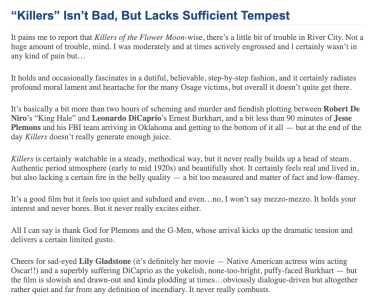
Cruel Jokes Skirt The Line
This ancedote is flirting-with-danger funny if David Chappelle‘s son was five or six when the altercation happened. If the son was 11 or 12 or older, it’s not funny.
What Was Hurricane Billy Thinking?
I don’t know how old this Friedkin interview is, but the video was posted two years ago. Imagine the collective chalk-on-a-blackboard reactions from the wokester Stalinists…all of those wonderful people whose adamant condemnation of Allen is why Coup de Chance, which will debut at the Venice Film Festival on Monday, 9.4 in Venice, can’t be programmed at the Telluride, Toronto or New York film festivals.


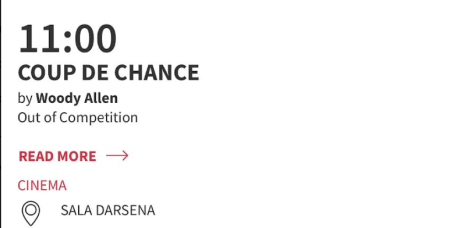
More Older Woman-Younger Guy Pairings?
I was into MILFs way before the acronym became familiar, you bet.
When I was 12 or 13 I had the distinct hots for a married neighbor and a mother of four, although nothing ever “happened”.
The usual junior-high-school fantasies about my foxy 20something teachers interfered with my grades, of course.
When I was 15 or 16 my mother sat me down and warned me about predatory older women, which only whetted my appetite.
When I was 22 and living in Southport I was seriously entwined with a 34 year-old divorcee named Suzie, and I distinctly recall she and I being sternly lectured by her next-door neighbors about our perverse behavior.
When I was driving for Checker Cab in Boston I was briefly hot-and-heavy with a classy, salt-and-pepper-haired woman of means, and in the late ’70s I had at least three casual affairs with Westport women in their late 30s and 40s.
Hence my lifelong interest in films about same. The fruit wasn’t forbidden, but was at least frowned upon to some extent.
The first poke-through was A Cold Wind in August (’61), in which a 30something stripper (Lola Albright) fell for a 17 year-old lad (Scott Marlowe). Six years later the bloody doors were blown off by a fascinating affair between the 40ish Mrs Robinson (played by a 35 year-old Anne Bancroft) and the 20-year-old Benjamin Braddock (Dustin Hoffman was 29) in Mike Nichols‘ The Graduate (’67).
Two years later came That Cold Day in the Park (’69), in which the 30-year-old Sandy Dennis became deeply involved with an 18 year-old (Michael Burns).
Such affairs, in short, enjoyed a certain Hollywood vogue for a while, but then wore off and pretty much went away. I’m sure I’m forgetting a few titles, although Sirk’s Magnificent Obsession doesn’t count due to the emotional constipation factor, no to mention Jane Wyman‘s extremely unflattering pageboy haircut.
Now, in any event, there’s a slight resurgence of this kind of thing with May December (Netflix, 11.17), a curiously admired Todd Haynes drama that’s partly based upon the real-life affair between school teacher Mary Kay Letourneau (now deceased) and Vili Fualaau, who was around 13 when things began to happen. Letourneau was jailed but they were subsequently married, and wound up with two kids. Letourneau died of cancer on 7.6.20.
Julianne Moore plays the Letourneau-resembling Gracie Atherton, a neurotic 60something dessert chef who’s married to Joe Yoo (Charles Melton), a 36 year-old half-Korean dude who was also around 13 when Gracie technically “raped” him while they were working together at a pet store, and with whom they’re currently raising two or three college-age kids.
I’m not a fan of May December, which will open the N.Y. Film Festival on Friday, 9.29. But at least it’s resuscitated the notion of risque, once-frowned-upon relationships of this kind.
I’d like to see such pairings depicted more often. One interesting possibility, for example, would be the real-life, four-year affair between Barbara Stanwyck and Robert Wagner, whicb began when they were respectively 45 and 22 — a striking age difference that caused, in the parlance of Eric Clapton, talk and suspicion.
I’m mentioning Stanwyck-Wagner because no female industry professional or film critic would raise their eyebrows if such a relationship were to be dramatized today. It would pass muster by current standards, although the depiction of an older man-younger woman Hollywood age-gap affair of 20 or 25 years, which used to be fairly common, would never be produced in today’s climate.
It’s extremely difficult to imagine anyone wanting to remake, say, Up Close and Personal, an unsuccessful 1996 romantic drama that was vaguely based upon the life of the late Jessica Savitch, and dealt with a May-December relationship between an older TV news producer (Robert Redford) and a young ambitious reporter (Michelle Pfeiffer). Such a story would probably be regarded as problematic and distasteful, to say the least.
No one today would touch a remake of Fred Schepisi‘s The Russia House (’90) with a twenty-foot pole. A romantic espionage drama based on a John Le Carre novel, it presented a love affair between Pfeiffer (then 32) and Sean Connery (then pushing 60) — a 28-year gap.
I could go on and on about older guy-younger woman relationships of this sort, which used to be par for the course but are now mostly out of the question. But older women and younger guys? No problemo.
Perfect Capturing
Okay, it never became an Esquire column — “Hollywood Weltschmerz: The Celebrity in Pain.” But it has a really great ring, and I can’t stop thinking about it. It could be a catchy book title, for sure. If I tap out a book about my HE travails, I could call it “Hollywood Weltschmerz: The Columnist in Pain.”

Hitchcock’s Shame
No, not his treatment of Tippi Hedren. His failure, I mean, to respect the Lakota Sioux’s sacred Paha Sapa (Black Hills) in South Dakota. He did so by callously and obliviously staging the thrilling climax of North by Northwest atop the shamefully chiselled and misappropriated Mount Rushmore. Never forget that the British-born Alfred Hitchcock couldn’t have cared less. Sic semper auteurists!
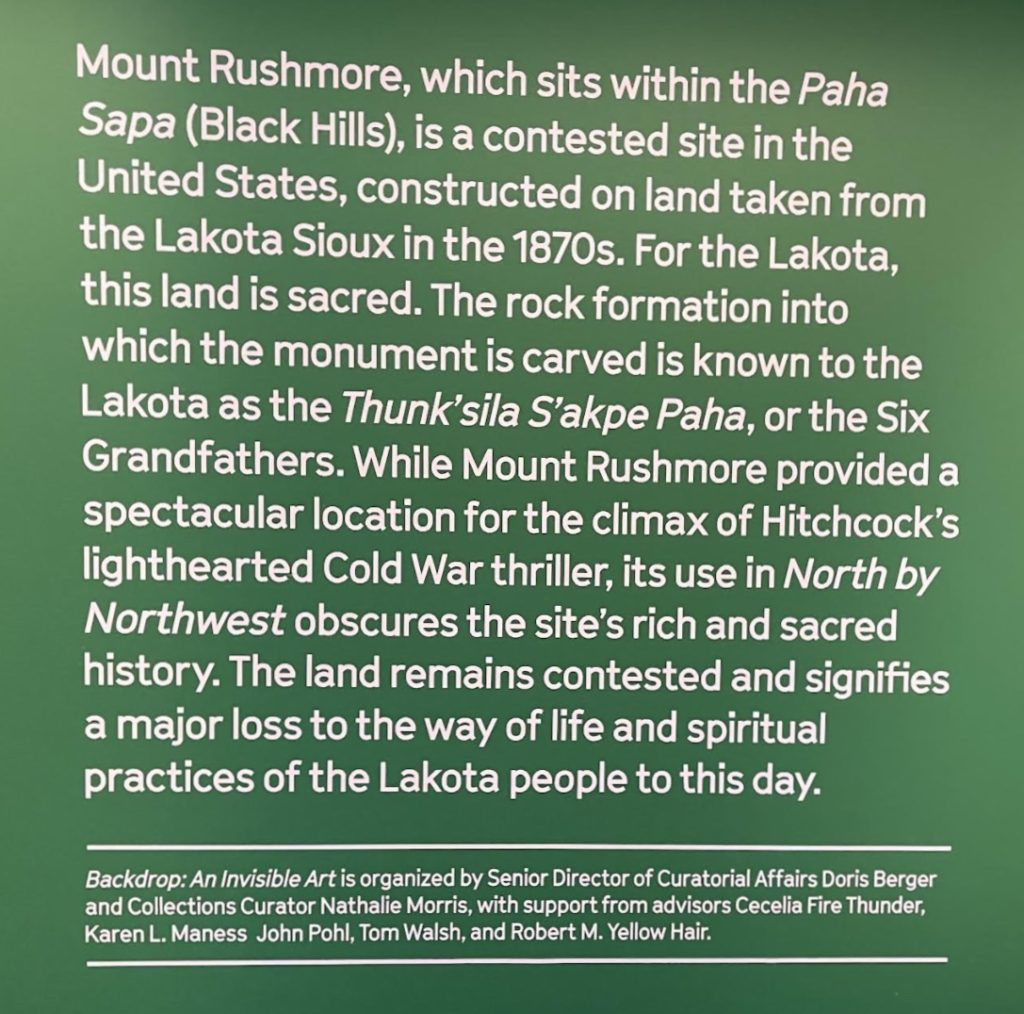
Queen’s “Fat-Bottomed Girls” Deep-Sixed on Yoto
Yesterday the Daily Mail‘s Katie Hind reported that Queen’s “Fat Bottomed Girls“, a 1978 track written by Brian May, has been removed from a “Queen’s Greatest Hits” collection on Yoto, a newish audio platform aimed at Zoomers and Gen Alpha.
The reason, of course, is that the word “fat” has been banned from the cultural vocabulary by body-positivity advocates. Fat or obese persons no longer exist — there are only different people of different shapes, livin’ their lives and owning their bods.
What this means, of course, is that rock lyrics are now being subjected to sensitivity editing in the same way that classic books with problematic content have been re-edited and to some extent censored.
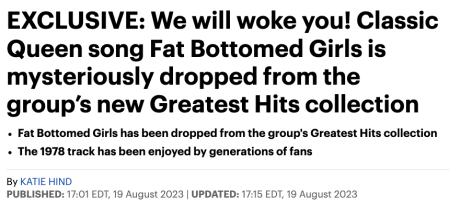
Mel Brooks: “What Knockers!”
I don’t feel like posting any more today. It’s 4 pm, and I wish I was experiencing the non-hurricane that’s currently soaking Los Angeles.
Against my better judgment I’ve decided to give Oppenheimer a second viewing at 6 pm. I’m almost sure I won’t like like it any better (it’s a very smart, well-crafted film but I wasn’t enraptured) but let’s see what happens.
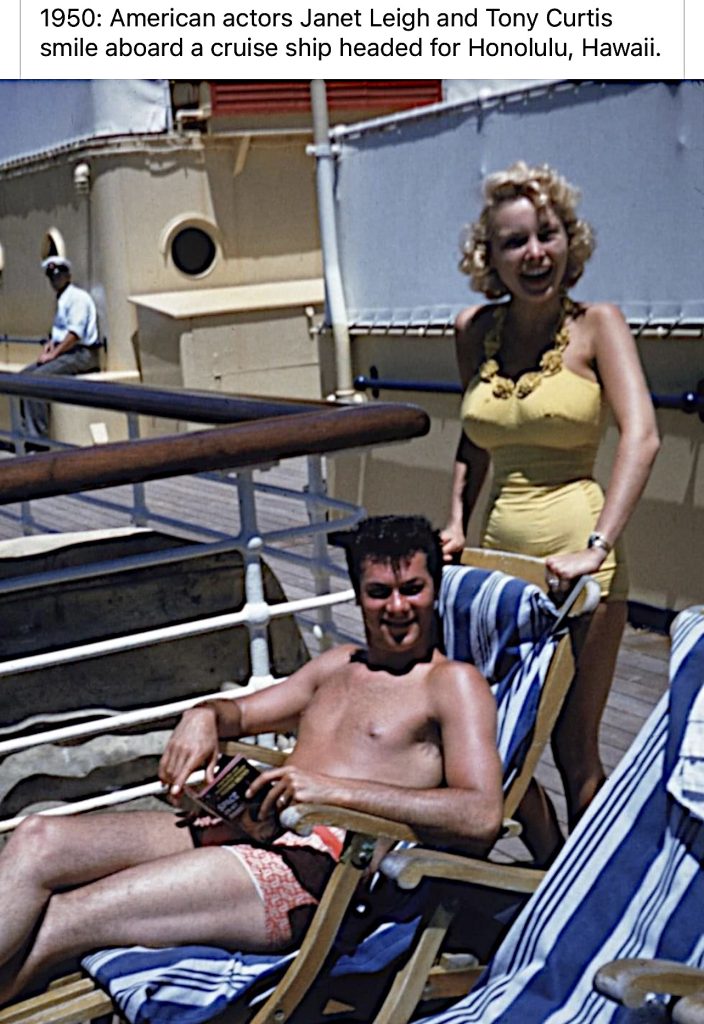
Finally Submitted to “Only Murders in the Building”
You’re supposed to be tickled by Only Murders in the Building, which is now in its third semi-triumphant season. The producers and costars (Steve Martin, Martin Short, Selena Gomez) want you to kick back and succumb to whatever…light-hearted chuckles, titters, the occasional guffaw.
Why have I never watched it? Because I knew I’d hate it.
One of my least favorite Woody Allen films is Manhattan Murder Mystery (’93), which is basically a faux-farcical black comedy about an older Manhattan couple (Allen, Diane Keaton) investigating the mysterious disappearance of a married neighbor in their Upper West Side apartment building. It was wittily written but felt labored and strained, and it wore me out within the first 40 minutes.
Plus I’ve never liked “amusing” murder-mysteries to begin with…sorry. And I always avoid anything Agatha Christie-ish. Killings + formula…later.
Which is why I’ve never given Only Murders in the Building so much as a single glance.
It’s about a wisecracking threesome — Charles (Martin), Oliver (Short) and Mabel (Gomez) — who reside in a swanky Upper West Side building and solve murders as a kind of…I don’t want to explain or even think about this crap. They run a true-crime podcast and need fresh murders, I suppose, for discussion material. It’s a really stupid premise.
The current season of Only Murders in the Building is focusing on the Broadway theatre milieu, and I wanted to sample Meryl Streep‘s performance. So last night and against my better judgment I gave it a try, but figured I should start with an introductory episode from season #1.
I felt instantly miserable. I was exhaling, groaning, truly hating my life. I didn’t feel tickled or tittered or tingled. I just sat there and asked myself “why am I watching this?”
I also wondered “why doesn’t Steve Martin look like he did when he co-hosted the Oscars with Alec Baldwin? (Answer: That was 13 years ago, and Martin is now 77.) And why is he wearing that awful little pork-pie hat? And why is the tone of the show so silly? And why does it feel so tepid and neutered, like it’s afraid to offend septugenarian viewers? And why have the whore critics praised it so? And why does the dialogue feel so tedious and lame? And why have they cast Michael Cyril Creighton as one of the building neighbors?”
I’ll be watching a couple of Streep episodes tonight or tomorrow, but my negative attitude isn’t going to change….just saying.
Son of Broken Deliveries
Posted three and one-third years ago (12.8.20): The greatest performances always allow for imperfect or awkward speech. Phrasing drop-outs, hiccups, stumbles, running out of breath, etc.
Prime example: Marlon Brando delivering Marc Antony‘s “friends, Romans, countrymen” speech in Joseph L. Mankiewicz‘s Julius Caesar (’53). At 2:08 Antony, overcome with emotion, says “bear with me” to the crowd, and then “my heart is in the coffin there with Caesar, and I must puh…pause ’till it comes back to me.” Brando stuttering on “pause” is deliberate, of course, but it sounds and feels right.
[From brenkilco] Brando in The Godfather: “It makes no…it doesn’t make any difference to me what a man does for a living, you understand.”
James Caan‘s Sonny beating up Gianni Russo‘s Carlo in The Godfather (’72). At 2:52, after kicking Carlo a few times in the ribs, Sonny says, “If you touch (beat, catching his breath) my sister again, I’ll kill ya.” I’m presuming this wasn’t planned…Caan was tired from the exertion and just ran out of wind, and director Francis Coppola liked the realism.
{From Vito Cabiria] Near the end of Paths of Glory Kirk Douglas doesn’t quite have enough lung power to say the word “again” — he barely manages to squeak it out — when he’s telling Adolphe Menjou “and you can go to HELL before I apologize to you now or ever again!”
[From NephewOfAnarchy] Bill Macy‘s flubbed Boogie Nights line: “My wife’s on the driveway with an ass in her cock!” Paul Thomas Anderson left it in because it sounded like the kind of thing a genuinely flustered person would say.
